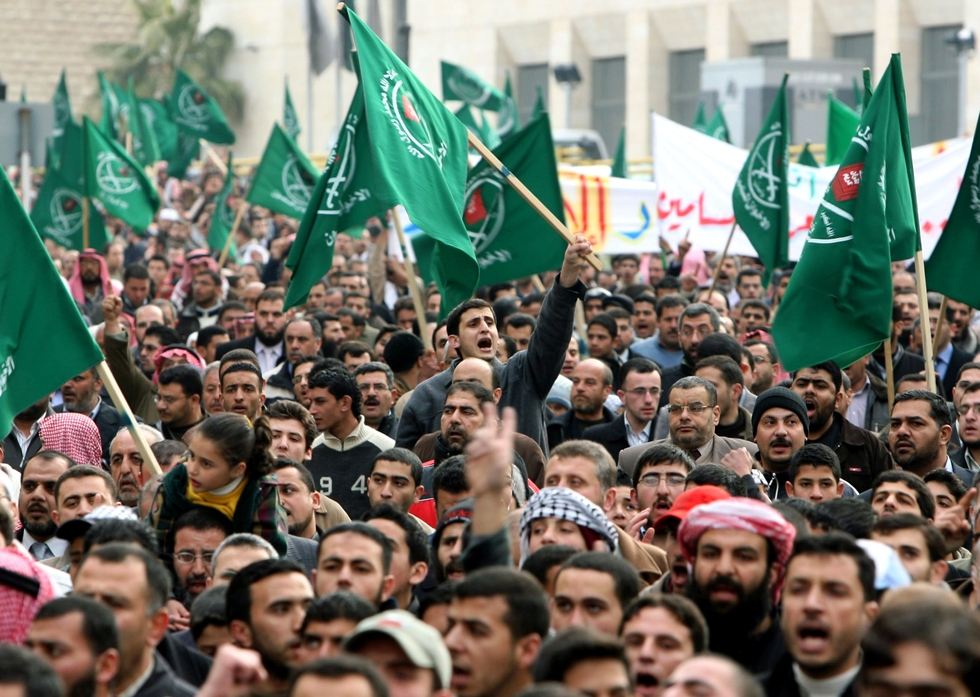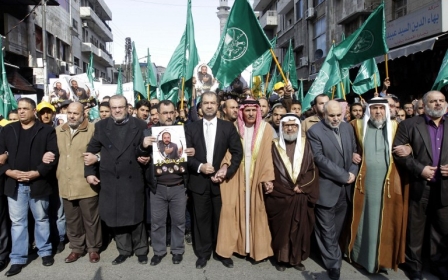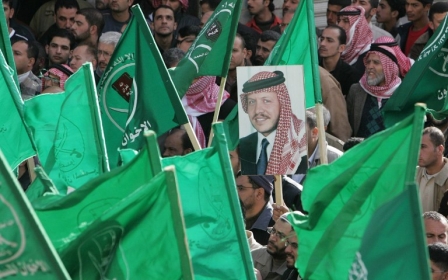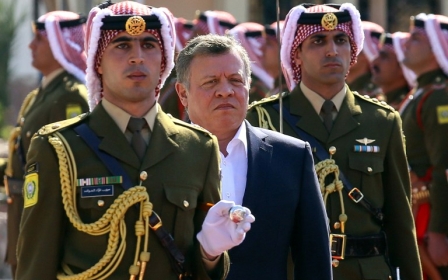Jordanian security services close Brotherhood's headquarters

Jordanian security services shut the headquarters of the country's Muslim Brotherhood in Amman and also a second office in nearby Jarash on Wednesday.
The move is the latest tussle between the government and Jordan's biggest opposition group with tensions running high in the run-up to next year's parliamentary elections.
A security source told AFP that the Amman governor ordered the closure of the offices, which are located next to the country's parliament building because the group had not obtained legal authorisation for its activities.
Abdelkader al-Khatib, a lawyer for the Brotherhood, said security services searched the headquarters before sealing off the keyhole of the office's entrance with red wax.
"This is clearly a political decision in line with what is happening in the region," Khatib told the agency.
The closures "has the sole purpose" of influencing legislative elections expected to be held early next year, he added.
Authorities said they also closed the office in the Jarash governorate, north of the capital, again with wax, because the organisation did not have the right permit, Sky News Arabia reported.
Last year, the group in Jordan split into two branches after authorities said that the organisation needed to "correct" its legal status, in spite of a 1946 cabinet decision licencing it as an offshoot of the Egyptian Muslim Brotherhood.
In response, about 50 Brotherhood members set up a "charitable society" - the Muslim Brotherhood Society (MBS) - which was quickly approved by authorities and declared as the "official" group.
MBS has since grown to about 300 members, although the original group still has the majority of the organisation's followers and commands support from as much as 30 percent of the population, sources told MEE.
Last month, the governor of Aqaba extended a closure of the original Brotherhood group's office in the port city after a dispute between the MBS and the original group over ownership, al-Monitor reported.
Then in late March, authorities banned the original group from holding internal elections, which have been held for the past 70 years, again saying it did not have the correct licence.
Khaled al-Kalaldeh, Jordan's minister of political development, told al-Monitor earlier this month that the government was not planning to ban the original group, but had halted the elections because it is not a legal entity and the MBS had filed a complaint saying that the group was using its name.
"The government is dealing with this issue with restraint, knowing the weight of the groups and its party on the popular political scene," Kalaldeh was quoted as saying.
Boycott or not?
While the closures appear to reflect a combative dynamic between the Brotherhood and the state, experts say the developments are more a reflection of an internal struggle within the Jordanian Brotherhood.
"It's tempting for people who don't follow Jordan closely to see this and immediately see parallels with the treatment of the Muslim Brotherhood elsewhere," said David Patel, a junior research fellow at Brandeis University's Crown Center for Middle East Studies.
"But the Jordanian government is not going to go to war with the Muslim Brotherhood like Egypt's government have."
Instead, Patel said he believes that the state is trying to take advantage of that struggle to keep the only organised political force in the country under control and to stop them from boycotting elections, which would harm the polls' legitimacy.
For decades, the Jordanian Muslim Brotherhood has had a good relationship with the monarchy and has operated legally and openly, he said.
More recently, however, the group has started to fissure around whether or not it should participate in elections.
Before each election, the government changes electoral rules which, for example, alter the number of seats allotted to districts and how many votes districts have.
"The Muslim Brotherhood looks at the rules and decides whether they are going to boycott or not depending on the changes," he said. "This is a game repeated over and over."
Whenever the group boycotts elections, as it has done in the past two polls, groups split off from the main organisation.
Last month, when the government banned the orginal group's internal elections, Nabil Kofahi, a former Jordanian Brotherhood leader, told MEE he thought it was likely that an unofficial deal would be struck between the government and the group, allowing the original organisation to hold its elections if it participates in parliamentary polls.
If the main organisation boycotts elections a third time next year, Patel said, it would be a disaster for the government.
"[The government] wants them to be part of the political system. It’s telling them – prove you are part of the Jordanian system by participating," he said.
"But it’s doing it through bureaucracy. It’s not doing it through guns. Sending some police officers to put wax on the door is not like the mukabarat [the secret police] rounding people up."
New MEE newsletter: Jerusalem Dispatch
Sign up to get the latest insights and analysis on Israel-Palestine, alongside Turkey Unpacked and other MEE newsletters
Middle East Eye delivers independent and unrivalled coverage and analysis of the Middle East, North Africa and beyond. To learn more about republishing this content and the associated fees, please fill out this form. More about MEE can be found here.




